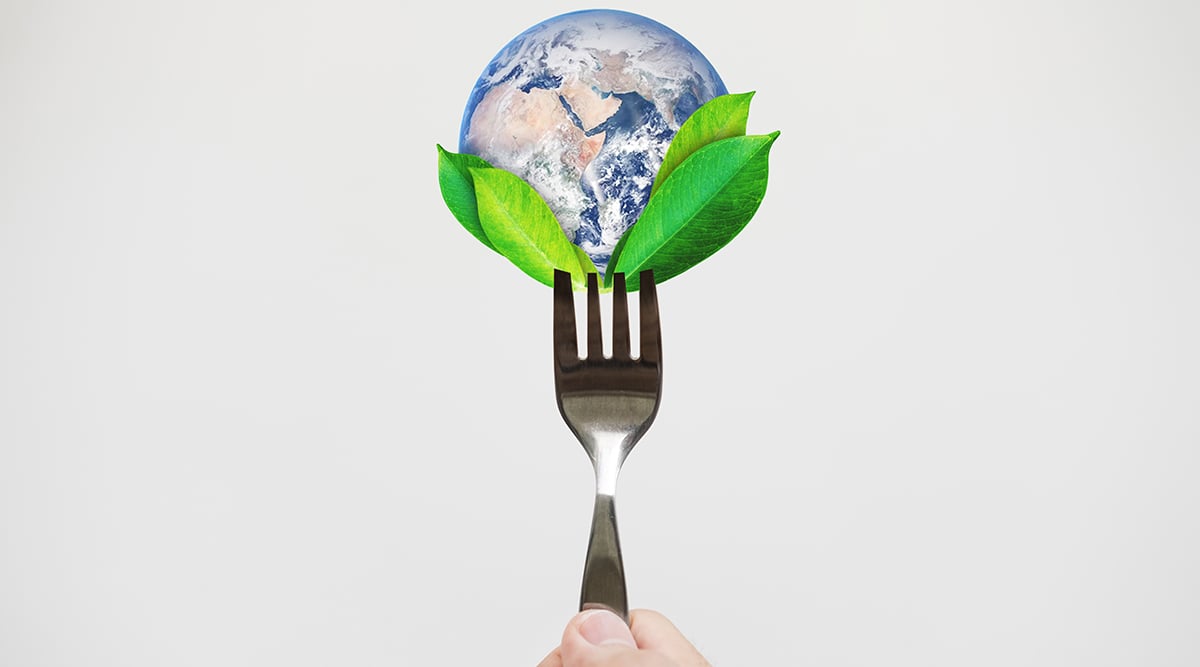Diet Changes Help the Planet
A recent study shows that dietary pattern changes have reduced the carbon impact of food consumption.

May 2023
Volume 77, No. 4

Concerned about where the planetary diet might be taking the planetary climate? Then take heart from a recent study which posits that global denizens have made a lot of progress in adopting food-consumption practices that already have taken a bite out of climate change.
Turns out that changing dietary patterns in the United States over the past 15 years already have cut the carbon footprint of national food consumption by more than 35%, according to a study published last year in the Journal of Cleaner Production and led by Clare Bassi, who was then with University of Wisconsin and now is with Third Economy, a sustainability consultancy.
Lower consumption of beef, dairy, chicken, pork, and eggs accounted for more than 75% of the observed diet-related carbon dioxide savings during the study period, with beef alone being responsible for nearly half the drop.
“National greenhouse gas savings from dietary changes alone” over the course of the study period from 2003 to 2018 “are roughly equivalent to offsetting emissions from every single passenger vehicle in the country for nearly two years,” Bassi told On Wisconsin magazine. The study analyzed eating habits reported by more than 39,000 adults in a national survey.
Demographics mattered little: Bassi’s study showed that the diets of every subgroup of Americans categorized by factors including sex, age, race, and household income showed a 30% to 50% reduction in responsibility for diet-related greenhouse gas emissions.
More progress is needed, however. The U.S. diet-related carbon footprint in 2018, the study found, was still twice as high as global targets for minimizing global warming.
“People’s actions are making a difference,” Bassi said. “But we still have a long way to go.”
Digital Exclusives

10 Food Trend Predictions for 2022
The editors at Food Technology magazine, published by the Institute of Food Technologists (IFT), have announced their predictions for the hottest food trends for 2022.
Food Technology Articles

How to Achieve EPR-Forward Packaging, Part 2
In this two-part series, the author explores the history of Extended Producer Responsibility (EPR), what is needed to help EPR succeed, and how brands can best prepare for EPR.

How to Achieve EPR-Forward Packaging
In this two-part series, the author explores the history of Extended Producer Responsibility (EPR), what is needed to help EPR succeed, and how brands can best prepare for EPR.

Keeping the ESG Promise
An infographic describing food and beverage companies’ outlooks regarding ESG initiatives.

Ag-Tech’s Passionate Pragmatist
Agrologist and agricultural futurist Robert Saik wants to feed the world better and more sustainably. To make that happen, leveraging science and technology will be critical.

The State of Sensory Science
Three seasoned sensory scientists share their thoughts on the complexity of measuring consumer perceptions, the value of academic/industry collaboration, the evolution of the discipline, and why they love what they do.
Recent Brain Food

Supporting Sustainable Innovation
Health, welfare, and sustainability concerns have spurred consumers to explore plant-based alternatives. In this sponsored content interview, global ingredients company ofi discusses the forces driving this growing trend, and how it supports product innovation in this emerging category.
IFT Science and Policy Team Forecasts Six Trends for 2023
From a processed foods comeback to breaking food system silos and addressing food and nutrition security, our science and policy experts identify top science of food trends.
ICYMI: Our Most-Popular Business FIRST Conversations Available Online
Tune in to the IFT FIRST on-demand content channel and hear from experts and innovators who are making big impacts.
IFT Scientists' Top 5 Food Trends to Consider in 2022
What's on the horizon for the global food system in 2022? IFT’s Science and Policy Initiatives team gives their predictions on five trends that are expected to take shape in the new year.
New Program Highlights Untapped Potential of Using Food Science for Relief and Development Initiatives
The new field of Food Science for Relief and Development (FSRD) offers a fresh, high-impact approach to tackling problems of global food security, poverty, and malnutrition.
